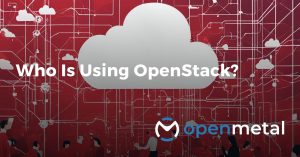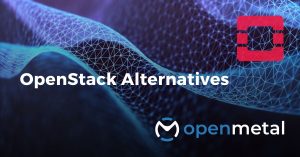OpenStack has come a long way since its first release in 2010 with Austin, the debut of this amazing open source cloud computing platform. OpenStack has recently announced its 30th release! This milestone release is a testament to dedication and hard work of the open source community towards developing and maintaining OpenStack. OpenStack started out with only two services and now there are over 50 official OpenStack services that serve different functions in OpenStack clouds.
As always, the path of OpenStack’s software development is directed by the needs of the user, and with AI workloads being a reigning topic in the tech world, you can expect some key features in this new release for AI workloads.
What Is OpenStack Dalmatian 2024.2
OpenStack Dalmatian 2024.2, the 30th release for the OpenStack cloud platform, features major improvements for AI and high-performance computing workloads, enhanced security, and user experience updates. Some of the key updates include expanded GPU support in Blazar for reserving compute instances, persistent virtual GPU handling in Nova and security updates in Ironic, Neutron, and Nova.
What OpenStack Services Were Enhanced With Dalmatian 2024.2?
 Blazar is OpenStack’s resource reservation service which allows users to reserve cloud resources like compute, storage, and network bandwidth for specific time periods. It was first released in 2014 and is an amazing tool for workloads that require guaranteed resource availability such as HPC, AI model training, or scheduled maintenance. With Dalmatian 2024.2. Blazar now allows users to reserve GPU instances based on Nova flavors. This helps users allocate resources for AI and HPC workloads more effectively. In essence it simplifies the process for organizations to provision GPU-based compute power when needed which enhances the performance and efficiency of AI training systems.
Blazar is OpenStack’s resource reservation service which allows users to reserve cloud resources like compute, storage, and network bandwidth for specific time periods. It was first released in 2014 and is an amazing tool for workloads that require guaranteed resource availability such as HPC, AI model training, or scheduled maintenance. With Dalmatian 2024.2. Blazar now allows users to reserve GPU instances based on Nova flavors. This helps users allocate resources for AI and HPC workloads more effectively. In essence it simplifies the process for organizations to provision GPU-based compute power when needed which enhances the performance and efficiency of AI training systems.
 Nova is OpenStack’s compute project. It was first released in 2010 and it is responsible for provisioning and managing virtual machines, bare metal servers, and containerized workloads on OpenStack clouds.
Nova is OpenStack’s compute project. It was first released in 2010 and it is responsible for provisioning and managing virtual machines, bare metal servers, and containerized workloads on OpenStack clouds.
With Dalmatian 2024.2, Nova now has the ability to persist mediated vGPUs across compute host reboots with libvirt version 7.3.0 or higher. This allows continuity and performance optimization which is necessary to run large-scale AI workloads that require uninterrupted hardware acceleration. This release of Nova also comes with automated detection of virtual Trusted Platform Module (vTPM) support for compute services if libvirt version is above 8.0.0 and if swtpm is installed on the node. This ensures a higher level of security for virtualized environments. Additionally, Nova now allows users to require TLS connections for SPICE consoles adding another layer of communication security.
 Ironic was first released in 2014, it is the OpenStack project used to provision bare metal services. It was designed to manage and deploy physical machines instead of VMs. It allows users to provision and manage bare metal servers just as you would virtual instances which makes it an important project for workloads such as HPC, big data or AI which requires direct access to the hardware.
Ironic was first released in 2014, it is the OpenStack project used to provision bare metal services. It was designed to manage and deploy physical machines instead of VMs. It allows users to provision and manage bare metal servers just as you would virtual instances which makes it an important project for workloads such as HPC, big data or AI which requires direct access to the hardware.
With Dalmatian 2024.2, Ironic has several security enhancements. Rescue passwords are now protected by encryption and it has reduced the amount of sensitive information shown during system cleaning to safeguard data. Now communication between Ironic services and Ironic agent require encrypted connections. A new feature for Ironic, this enables users to update the firmware on active machines which allows them to apply important security updates without taking them offline. With this release, Ironic is now more user friendly, thanks to Runbooks. Ironic’s Runbooks is a self-service tool designed to simplify routine maintenance tasks while adhering to RBAC policies. It is a set of steps for node maintenance that can be automated by project members. This makes node management more efficient and secure.
 Neutron is OpenStack’s networking service that facilitates the management of networks, subnets, and routers in a cloud environment. It was first released in 2012 and allows users to create and manage network connectivity for VMs and other cloud resources. Neutron offers scalable and customizable networking as a service which encompasses features like IP address management, firewalling, load balancing, and security groups.
Neutron is OpenStack’s networking service that facilitates the management of networks, subnets, and routers in a cloud environment. It was first released in 2012 and allows users to create and manage network connectivity for VMs and other cloud resources. Neutron offers scalable and customizable networking as a service which encompasses features like IP address management, firewalling, load balancing, and security groups.
With Dalmatian 2024.2, Neutron has some RBAC updates. There is an added manager role support to its APIs which provides a more robust and flexible security model for managing cloud networks.
![]() Skyline is OpenStack’s modern web-based dashboard. It was first introduced in 2022 as a preview but with the Dalmatian 2024.2 release, it is now officially released as production ready. Skyline is a more user-friendly and visually updated user interface when compare to Horizon. This release incorporates support for additional OpenStack services such as Masakari, Designate, and Firewall-as-a-Service. Skyline will make it easier for organizations transition to OpenStack from cloud providers like VMware.
Skyline is OpenStack’s modern web-based dashboard. It was first introduced in 2022 as a preview but with the Dalmatian 2024.2 release, it is now officially released as production ready. Skyline is a more user-friendly and visually updated user interface when compare to Horizon. This release incorporates support for additional OpenStack services such as Masakari, Designate, and Firewall-as-a-Service. Skyline will make it easier for organizations transition to OpenStack from cloud providers like VMware.
 Manila is OpenStack’s file share service. It was first released in 2015 and allows users to create and manage shared file systems that can be mounted and accessed by multiple VMs or instances. Manila is ideal for workloads such as databases, web applications, or big data projects that require shared storage. It can support various file systems and protocols such as NFS and CIPS and integrates with a wide range of back end storage solutions such as CephFS, Red Hat GlusterFS, Huawei OceanStor, Dell EMC Isilon, and IBM Spectrum Scale.
Manila is OpenStack’s file share service. It was first released in 2015 and allows users to create and manage shared file systems that can be mounted and accessed by multiple VMs or instances. Manila is ideal for workloads such as databases, web applications, or big data projects that require shared storage. It can support various file systems and protocols such as NFS and CIPS and integrates with a wide range of back end storage solutions such as CephFS, Red Hat GlusterFS, Huawei OceanStor, Dell EMC Isilon, and IBM Spectrum Scale.
With Dalmatian 2024.2, Manila now allows users to manipulate storage capabilities via shared metadata. Cloud Operators can decide which features can be changed, and users will receive notifications about any updates or changes as they happen in the background.
Learn More About On-Demand OpenStack
More From OpenMetal…

It may be surprising to see large scale use cases such as Walmart or China Mobile, or use cases in organizations like NASA who have stringent security regulations, but the ability of organizations to fine tune and customize OpenStack in the code makes it the ideal infrastructure software for organizations with the skills on hand . …. Read More

Explore alternatives to OpenStack – Apache CloudStack, VMware vCloud, Proxmox, Google Cloud Platform and Amazon Web Services. OpenStack is an open source platform composed of several independent components. These components interoperate with each other through Application Programming Interface (API)…. Read More

AWS vs GCP: Choosing The Right Cloud Platform
AWS and GCP are leading players in cloud computing, offering a wide range of services and attractive pricing. However, choosing the right platform requires understanding their strengths, customer pain points, and alternatives. Comparing and shopping around for cloud products can be complex … Read More
Test Drive
For eligible organizations, individuals, and Open Source Partners, Private Cloud Cores are free to trial. Apply today to qualify.
Subscribe
Join our community! Subscribe to our newsletter to get the latest company news, product releases, updates from partners, and more.




































